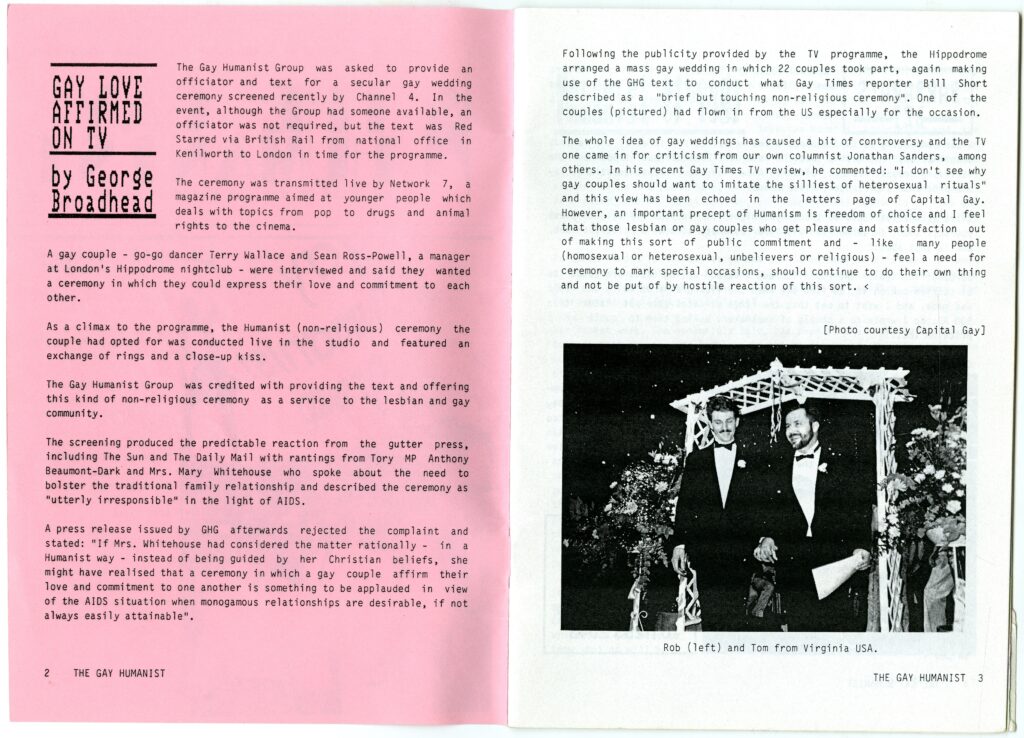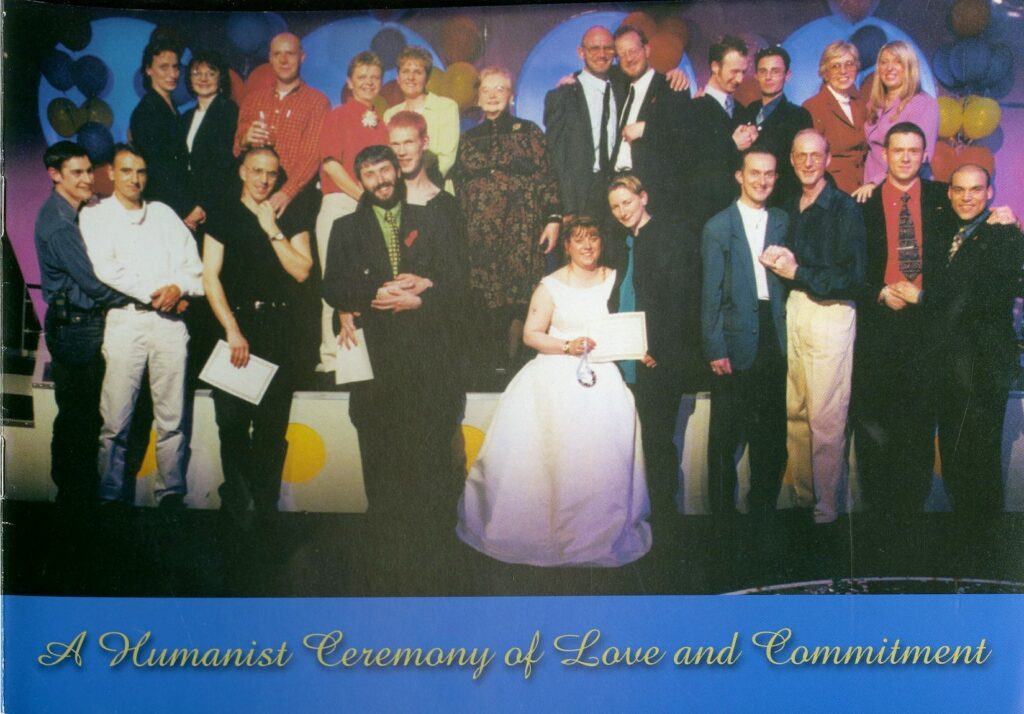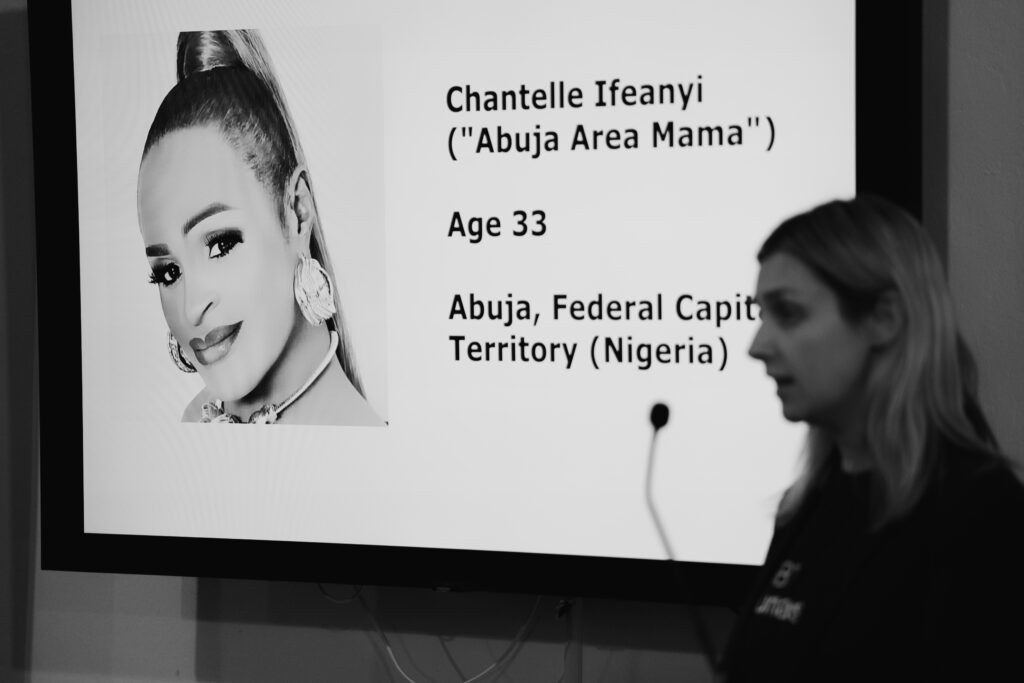
In this article, Heritage Project Offer Cas Bradbeer introduces some memorable moments from our heritage. From a mass gay wedding in a London nightclub to a memorial service for a Sierra Leonnean activist, LGBT Humanists has a decades-long history of poignant and pioneering secular ceremonies.
Our ceremony was at home – on our hearth-rug – and conducted by a Humanist friend… Did it make any difference? Well, yes. We had shared the meaning of our relationship with the people dearest to us. We had acknowledged their importance to us and they had been able to show us their love and support.
John and Gareth, printed in a brochure advertising LGBT humanist ceremonies, 2000
After their founding in 1979, the 1980s saw LGBT Humanists establish themselves as a major provider of affirmation ceremonies for LGBT couples. Humanist celebrants have conducted thousands of LGBT weddings over the past decades. Some were like John and Gareth’s, whose experience ‘at home – on our hearth-rug’ evokes visions of many early humanist ceremonies, conducted in private homes and living rooms across the UK. Others saw jubilations in public places, from a mountain-top to London’s City Hall. Starting long before civil partnerships or same sex marriage became legal, these unions were both heartfelt testaments to love and impassioned calls for LGBT rights.
Particularly notable was the 1987 live broadcast of a gay wedding on Channel 4’s influential youth music and current affairs programme Network 7. Writing in LGBT Humanists’ quarterly newsletter, the group’s Chair, George Broadhead noted it as ‘the first close-up gay smootcher on TV’. LGBT Humanists provided a script for the occasion, which was read on the Network 7 programme that also promoted the group as offering these kinds of ceremonies to couples across the country. Conservative campaigner Mary Whitehouse responded to the ceremony by brandishing it ‘utterly irresponsible’ in the context of the AIDS crisis, and claiming that it denigrated the traditional family relationship of marriage. Such hostile reactions were echoed by the likes of Tory MP Anthony Beaumont-Dark. Meanwhile there was disagreement about the idea of weddings within LGBT Humanists, with The Gay Humanist contributor Jonathan Sanders commenting on the ceremony, ‘I don’t see why gay couples should want to imitate the silliest of heterosexual rituals’. George Broadhead defended the offer of gay weddings with the humanist principle of supporting freedom of choice to the extent that it does not cause harm. Despite controversy, LGBT Humanists built on the publicity of this televised ceremony. Later that year, the nightclub owned by one of the happy couple (the Hippodrome in London) hosted a mass gay humanist wedding of 22 couples, including a pair who flew especially from Virginia in America for the occasion!

As a result of the publicity, LGBT Humanists were asked to provide their ceremony materials to the curators of The Wedding exhibition that toured museums across the UK from 1988 to 1989. Their script, certificate template, and photographs of the mass wedding were displayed among works by major figures in the art world like gay Pre-Raphaelite painter Simeon Solomon. Another work featured in the exhibition was by Rachael Field – this painting, Illegal on the Street (1987), was exhibited in the LGBT Humanists 45th anniversary exhibition at Conway Hall in 2024.
LGBT Humanists Vice President, Barbara Smoker recorded in 1990 that the group was ‘getting more and more requests’ for their affirmation ceremonies. In 1993, another opportunity for publicity was presented when Edinburgh’s Festival FM broadcast the pledges of a lesbian couple, Karen and Jane. The Scottish celebrant, Ian Dunn, noted how he received a positive response to the radio broadcast from his colleagues the next day, who had previously avoiding discussing gay rights issues with him. By this time, LGBT humanist ceremonies had been extended to Norway, such as a mass secular gay wedding at Oslo’s City Hall, endorsed by the Norwegian Minister of Justice. In 2024, Humanist Heritage volunteers interviewed several LGBT Humanists, including the Norwegian Rolf Solheim. Below, you can listen and read his experience of delivering a speech at the wedding of Bill Schiller, an LGBT Humanists member and a co-founder of the International Lesbian and Gay Cultural Network. Rolf and Bill travelled internationally to deliver seminars on humanist marriages and funerals for LGBT people. Rolf also organised his hometown’s first humanist confirmation ceremony in 1973.
In 2000, a brochure was released to promote these affirmation ceremonies. On the cover was Humanists UK celebrant Barbara Smoker, who conducted hundreds – if not thousands – of humanist ceremonies. She stands proudly among eleven couples who were part of a mass gay wedding screened in 1999 on BBC 2’s Gaytime TV series.

Pioneering in this provision, humanists were also prominent campaigners for marriage equality. For example, LGBT Humanists joined the Equal Love Campaign, which challenged the European Court of Human Rights to induce UK law to be extended, allowing for heterosexual couples to have civil partnerships and for homosexual couples to have legally recognised marriages. The campaign was ultimately successful in lobbying the UK government for the Marriage (Same Sex Couples) Act 2013. Following the oral history project in 2024, you can now use the links below to hear and read testimonies from Humanists UK Patron Peter Tatchell, Humanists UK CEO Andrew Copson, and former LGBT Humanists Chairs Adam Knowles and Richard Unwin, who shared their memories of campaigning for equal marriage.
A vast number of humanist funerals and memorial ceremonies have been held for LGBT people. The humanist funeral of gay figure skater, John Curry, generated a flurry of interest in such ceremonies. He was well known for having come out before his performance at the 1976 Olympics, and he used his celebrity to champion AIDS research – including as part of the Skating for Life show in New York City. Following his premature death of an AIDS related illness in 1994, his humanist funeral was followed by a humanist memorial ceremony at Conway Hall in September of that year. LGBT Humanists members also organised funerals for their family and friends. Below is the testimony of former LGBT Humanists Secretary, David Christmas, who recalls his experience of humanist funerals, as well as his thought on marriage and godparents.
LGBT Humanists organised memorials for LGBT people internationally. In 2004, LGBT Humanists member Hans Hoekzema organised a remembrance ceremony for Sierra Leonnean activist Fannyann Eddy. Fannyann founded the Sierra Leone Lesbian and Gay Association (SLLAGA), despite homosexuality being illegal in the country since British colonial rule. In September 2004, she was sexually assaulted and murdered by men who broke into the SLLAGA office. Writing for the Winter 2004 edition of the group’s newsletter, LGBT Humanists member Tony Thorne spoke of Fannyann’s activism and recounted his experience of the ceremony where flowers were left and a candle was lit at Amsterdam’s Homomonument. Twenty years later, the poet Theophina Gabriel wrote a poem inspired by this story, which he performed at the LGBT Humanists fair. You can read Theophina’s poem below.
Mass remembrance ceremonies have also been an important part of LGBT Humanists. In 1997, LGBT Humanists and Outrage! organised a Queer Remembrance Day at the national war memorial march to the Cenotaph in London. The keynote speaker was LGBT Humanists member Sharley McLean, who fled to Britain as a refugee from Nazi Germany in 1939. Her gay uncle, Kurt Bach, was arrested by the Gestapo in a gay bar in Berlin in 1937, and died in the Sachsenhausen concentration camp. Despite being denounced by the British Legion as ‘distasteful’ and ‘offensive’, this event continued to be held annually throughout the 1990s. In 1999, LGBT Humanists Secretary David Christmas laid a floral wreath on the Cenotaph in the shape of a pink triangle – a symbol used in Nazi concentration camps to distinguish those imprisoned because they were gay or trans. Hear below from Outrage! founder and Humanists UK Patron, Peter Tatchell, as he recounts his experience of Queer Remembrance Day.

This ceremony is an occasion not only to pay tribute to the victims of prejudice, discrimination, and violence against trans people, but also to reflect on the progress of trans rights and to look with hope to a future in which the bigotry and maltreatment we experience will have been consigned to the history books.
Adèle Anderson speaking at the Trans Day of Remembrance ceremony organised by LGBT Humanists, 2018
Another important example of mass memorials organised by LGBT Humanists is their ceremonies for Trans Day of Remembrance. Since 2018, these have been held annually to highlight transphobia and the disproportionate number of trans people who have met violent deaths. Names and stories of trans people murdered in the past year are read, speeches are given by trans people from our community, and the London Humanist Choir sings poignantly as we remember these lives lost. For the first two years, the ceremony was led by Humanists UK Patron, celebrant, trans activist and musician Adèle Anderson. After a brief hiatus during the COVID Lockdown, an online event was organised by the then Coordinator of LGBT Humanists, Chris Lynch, who also organised the ceremony at Fitzrovia Chapel in 2022. In 2024, he was interviewed by a Humanist Heritage volunteer. You can find a clip from this oral history below.
Secular naming ceremonies for trans people are also an important part of our heritage. Along with weddings and funerals, namings continue to be offered by LGBT Humanists. Below is a clip from an oral history interview with humanist celebrant Elaine Lever. Here, she reflects on her experience working with her dance troupe to perform a naming ceremony for their trans member, Emma.
